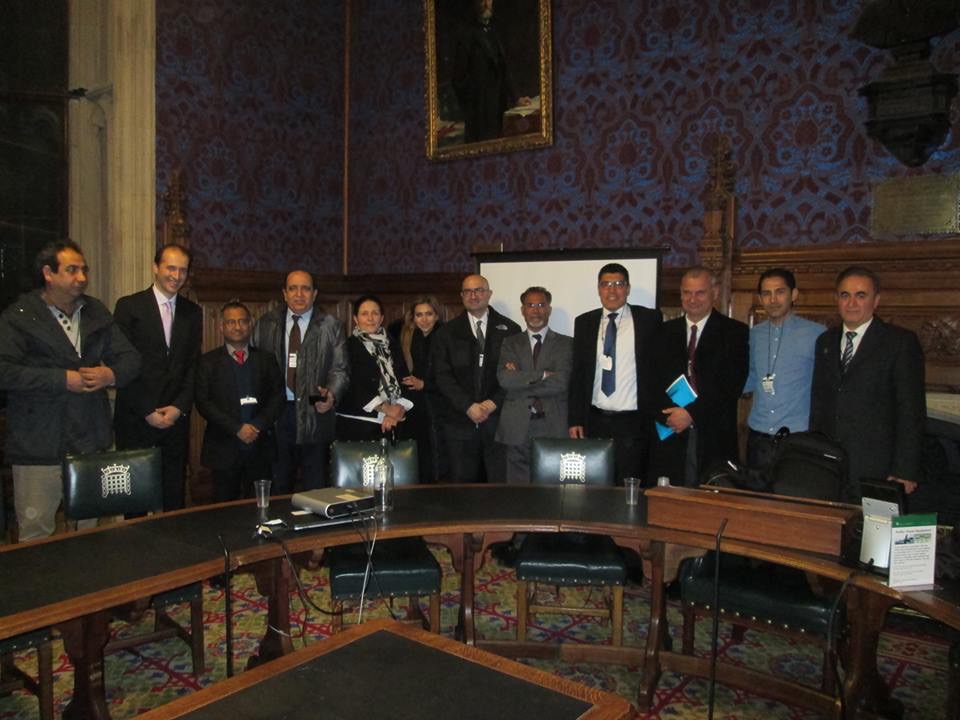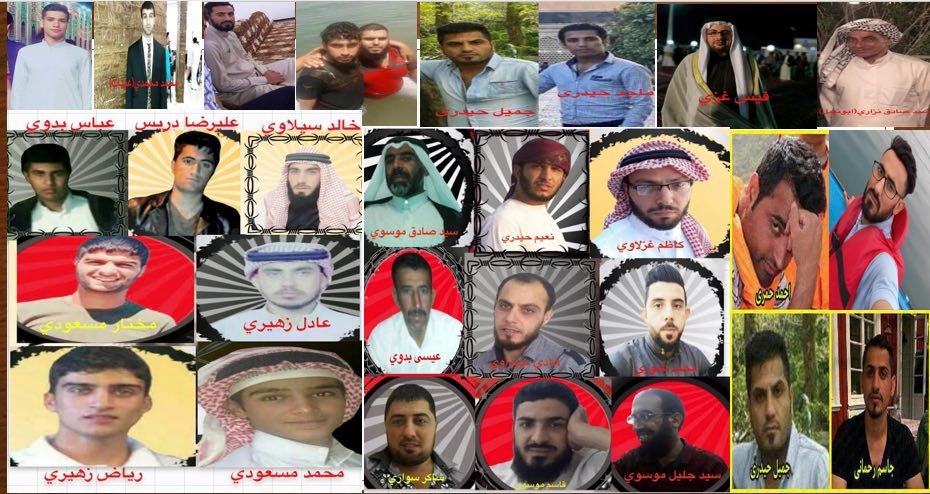AHRO DiscussedThe Plight Of Ahwazi Arabs In The British House Of Commons

Among attendance were officials from the UK Foreign & Commonwealth Office, a representative of the US Embassy in London, Members of Parliament and representatives of various human rights organisations, including Amnesty International, Open Doors UK and Middle East Concern. Also in attendance were members of Congress of Nationalities for a Federal Iran (CNFI), representing Iranian Kurds, Ahwazi Arabs and the Baloch people of Iran , in addition to Ahwazi Arab lawyers and activists .
in his speech ,Amir Saedi the director of Ahwaz Human Rights Organisation in Uk underscored that Iran’s minority groups “have not been accorded equal citizenship and their ethnicity or religion are not officially acknowledged [by the authorities].” He emphasised that “Arabs in Iran are caught in between an unfortunate phenomenon; they are subjected to racism due to historical Persian-Arab animosity.”
“Ahwazi Arabs have been one of the excluded constituent nationalities and socio-economically, among the most oppressed and rank at the bottom” and further stressed that “the Arab-populated border cities destroyed during the Iran-Iraq war have largely remained untouched. The regime damned and diverted the water of our rivers such as Karun to non-Arab areas of Isfahan, Yazd and Kerman while Khuzestan severely suffers from a shortage of [clean] drinking water.”
Full text of Mr.Saedi’s speech :
Good afternoon Ladies and gentlemen and distinguished gusts.
My Name is Amir Saedi and I am the director of Ahwaz Human Rights Organization in UK. My especial gratitude to the honorable Mr. Paulo Casaca and Mr. Mosa Zahed of Middle East Forum, he All-Party Parliamentary Human Rights Group, and other organizers of this event.
Iran is the most diverse country in the region. A multinational state that is comprised of six major nationalities including Arabs, Baluchis, Kurds, Persians, Turks, Turkmen and smaller groups of other ethnic/linguistic and tribal groups. No one ethnic group has a numerical majority.
Iran is also home to Sunnis, Christians, Jews, Bahis, manadis and others. These ethnic and religious groups comprise at least 50 to and by some estimates 2/3 of the society. Yet these groups has not been accorded equal citizenship – their ethnicity and/or their religion are not being officially acknowledged. Constitutionally, Persian language is the sole official language, and –Jafari Shiais is the offcially-santioned religion all other are ignored, oppressed, negated or at best marginalized. According to to Mr. Hajbabaei, former deputy minster of education, only 30% of Iranian students entering first grade speak Farsi.
An Iranian Shia and Fras/Persian is by default have been positioned in a great advantage and dominance visa-a-vis non-Persian nationalities – in multinational, multilingual and multicultural Iran.
Using Shia theology and Persian literature, history, language and the education, the system, strategically and deliberately, privileged one ethnic group over others, thus creating socio-economic inequality, exclusion and oppression thereby stifling any chance of democratic transformation.
Promoting aggressive nationalism in Iran often times manifest itself in anti-Arab racism and sometimes against Iranian Turks, Kurds and Baloch and non-Muslims such as Baha’is, and Sunnis and other minorities.
Arabs in Iran are caught in between an unfortunate phenomenon; they are subjected to racism due to historical Persian-Arab animosity. Ahwazi-Arabs have been one of the excluded constituent nationalities and Socio-economically, among the most oppressed and rank at the bottom.
There can’t be equality in citizenship if you do not speak the language of the court and the state.
Residing mainly in the southwest of Iran, the Ahwazi -Arabs are one of Iran’s most disadvantaged and persecuted ethnic groups. Arabs estimated to be between 5-7 million or about 10% of the population who live in the southwestern region of Iran, in the province of Khuzestan or as called by its indigenous name, eghlim Al-Ahwaz or Arabistan. The regime changed the Arabic name to Persian one to deny the Ahwazis their Arab identity – a durable solution would be to change to its original name, Arabistan.
Ahwazis are an ethnic, national and linguistic minority in Iran. Historically, this indigenous Arab community has been marginalized, excluded and discriminated against by successive governments in Iran. The province accounts for up to 90% of Iran’s oil GDP. Also 80% of Iranian wealth comes from our land- allocate some portion of the oil revenue to the region through legislation.
Ahwazi Arabs are subjected to a mixture of Persianisation, forced migration, violent political repression and economic exclusion – The regime has been resisting a proposal to establish a quota of 33% (1/3) employment for the local natives.
The Ahwazi Arab Nation in Iran has not been allowed to participate in running its own affairs. It does not have local or genuine national representation. The Arab minority in Iran is totally deprived of its civil, cultural, economic, political and social rights - a durable solution would be to allow local governance with representation from Ahwazis.
Khuzestan’s political, military and security commanders, officers, mayors and all high and mid-level government officials of Khuzestan have consistently been appointed from non-Arab areas – allow local employment in government
Among Ahwazis, the illiteracy rate is 4 times the national average. And unemployment is 6 times the national average.
Arabic and all other non-Persian languages such as Kurdish, Turkish and Balch are banned therefore denying them their linguistic rights and the competitiveness in the job market- Implement Iran articles 15 and 19 by allowing local Arabic mother language to be though in elementary schools
While Khuzestan oil from funds 90% of Iranian economy, Arabs live in abject poverty and do not share the riches of their land- and no part of this oil- zero%- has been allocated to them- There are not hired in the oil and gas companies- No employment quota is imposed on foreign companies to hires local Arabs, despite repeated demands by the local population.
Their demands for basic human rights, including education in mother tongue, social and economic justice has often been labeled as "separatist”, “secessionist”, “Wahabis” or called “stooges of foreign countries” or “danger to territorial integrity”.
The Islamic Republic government continues the forced resettlement policy to force the Arab population out of Arabistan by providing economic incentives and enticements to re-settle non- Arab population on the expropriated Arab farmlands.
The Arab-populated border cities destroyed during the Iran-Iraq war have largely been untouched. The regime dammed and diverted the water of our rivers such Karun to non-Arab areas, of Isfahan, Yazd and Kerman while Khuzestan severely suffers from shortage of drinking waters.
The regime does not permit any genuine Arabic newspapers and media in Arab-majority Khuzestan. Now, as in the previous regime, governor general of Khuzestan, all other province’s political, military and security commanders and officers, mayors and all high and mid-level government officials of Khuzestan have consistently been appointed from non-Arabs outside of the native Arab population.
Often, the Iranian government authorities in the Khuzestan refuse to register and issue birth identity cards to Arab newborn-babies, who do not assume Persian or Shiite names. Names of cities, towns, villages, rivers and other geographical landmarks were changed from Arabic to Persian during the previous Pahalavi regimes. These historical Arabic names existed for centuries. The regime refuses to consent to the Ahwazi Arabs’ request to change the names of these landmarks back to their historical Arabic names.
This regime, like the previous one in Iran, prevents any public mention of the Ahwazi Arab minority population. It has imposed a silence and news blockades in the national and international media against the existence of Arabs in Iran.
Iranian government in the past 8 years, a ironically in the past year since the election of Mr. Rouhani, intensified its campaign of repression against Arab freedom fighters, human rights and political activists and students by publically executing over 30 activists including writers, poets, high school teacher Mr. Shabani, Rasehedi.
Notwithstanding all the oppression, various Ahwaz-Arab political parties as well as Ahwazi-Arab confederation of tribal leaders are against and reject all forms of terrorism and violence. They struggle for the establishments of a civil society and strengthening the principles of democratic values.
Good or bad, defeat and suppression of various anti-regime democratic movements in Iran has proven that
All constituent members of Iranian society must participants in any democratic transformation. The recent June 2009 Green movement that remained confined to the capital Tehran and was crushed has shown that unless the movement can expand and spread throughout the country to the Turkish, Kurdish, Arab, Balochi and Turmen regions, the chances of any democratic transformation will be a challenging one - that is these oppressed ethnic, linguistics and religious minorities, along the women, students, youth and workers, will play a critical role in future of Iran.
for more information about the panel please click on the lick below :
http://me-fd.org/mefd-holds-event-in-the-house-of-commons-concerning-persecution-of-irans-minorities/#more-911








